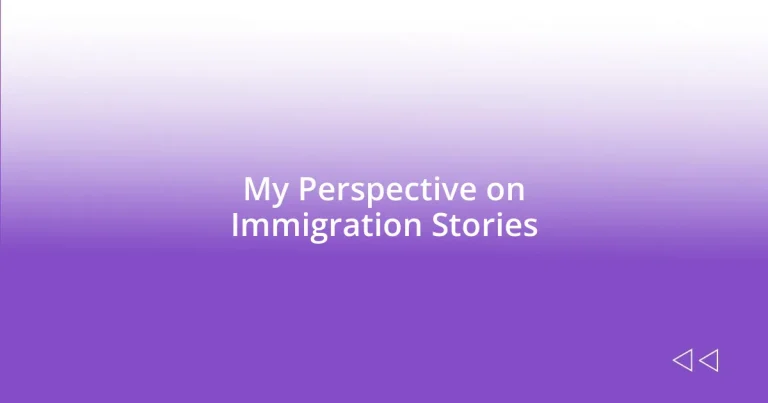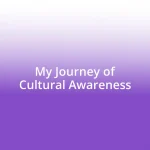Key takeaways:
- Personal immigration stories highlight the unique challenges and resilience individuals face, fostering empathy and understanding beyond statistics.
- Immigrants contribute significantly to their communities by enriching cultural diversity and driving economic growth through entrepreneurship.
- Collective support and community advocacy play crucial roles in navigating the emotional and practical challenges of the immigration process.
- Each individual’s experience emphasizes the importance of perseverance and the impact of shared stories in reshaping societal perspectives on immigration.
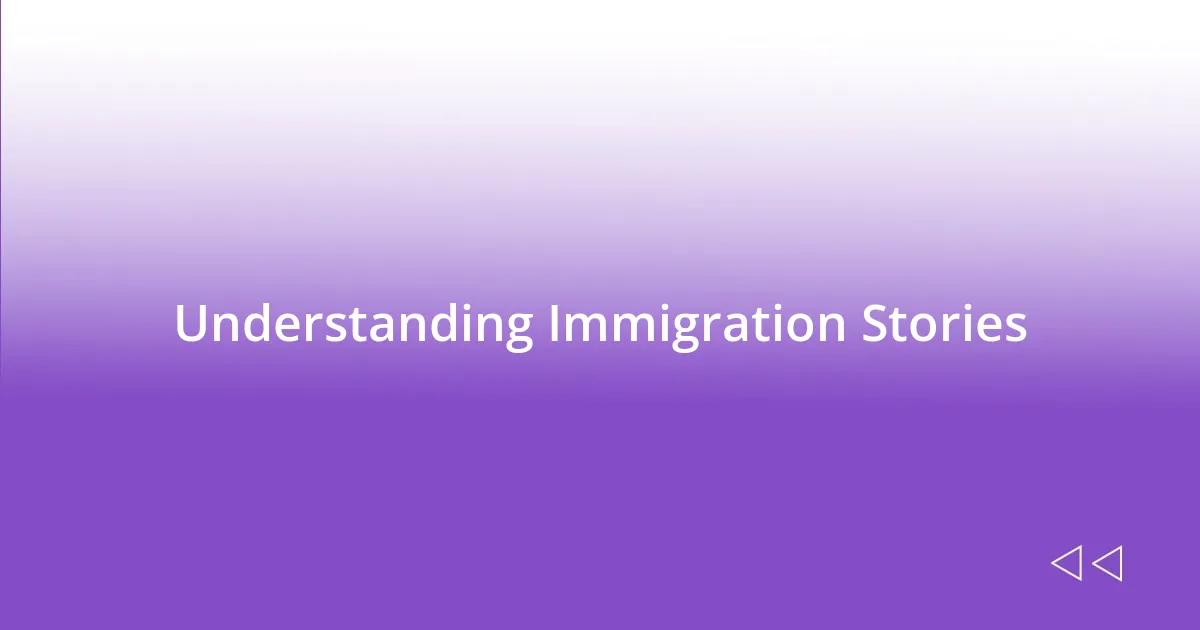
Understanding Immigration Stories
Understanding immigration stories requires us to dive deeper into the personal experiences that often get lost in statistics. I remember hearing the story of a young woman who left her home country with little more than hope and a few belongings. How many of us can relate to that overwhelming mix of excitement and fear when faced with a leap into the unknown?
Every immigration journey is unique, shaped by cultural backgrounds, aspirations, and challenges. For instance, I once met an elderly man who spoke about crossing borders in search of a better life for his family, feeling a mix of nostalgia and determination. What drives someone to leave everything familiar behind, and what does that sacrifice say about their hopes for the future?
These narratives are vital for empathy, as they reveal the raw humanity behind immigration policy debates. Listening to stories like his can transform our understanding, prompting us to ask ourselves: how can we support those who embark on such transformative journeys? It’s moments like these that remind me we’re not just talking about numbers, but about lives filled with dreams and struggles that deeply connect us all.
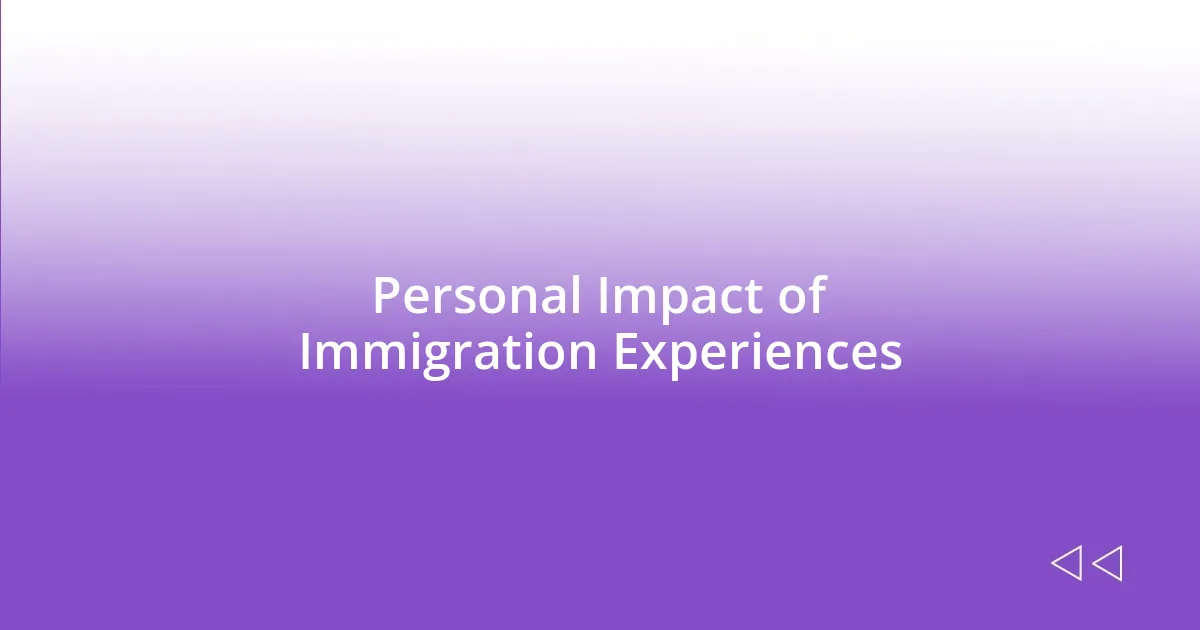
Personal Impact of Immigration Experiences
Personal immigration experiences often shape one’s identity in profound ways. I remember a friend who moved from Mexico to the U.S. at the age of ten. As she navigated a new language and culture, she shared how isolating it felt initially, but it also fueled her determination to excel academically and embrace her heritage. This blend of struggle and resilience can define not only how we see ourselves but also how we contribute to our new communities.
On another occasion, I spoke with a refugee who fled war-torn Syria. His story of losing family members and the heartbreak of leaving his homeland resonated deeply with me. Yet, in his eyes, I saw a spark of hope and the drive to create a new life for his children. It’s remarkable how immigration can bring both immense challenges and the opportunity for rebirth, reinforcing the idea that while the journey can be fraught with difficulty, it often comes with the potential for growth and renewal.
Reflecting on these experiences, I’ve realized that the emotional impact of immigration reaches far beyond the individual. It’s a shared journey filled with collective memories—transitions that families endure together. When we embrace these stories, we open the door to deeper understanding and connection, ultimately creating a richer tapestry of shared human experience.
| Positive Impacts | Challenges Faced |
|---|---|
| Community integration and new friendships | Cultural and language barriers |
| Personal growth and resilience | Emotional distress and trauma |
| Contributions to society | Discrimination and bias |
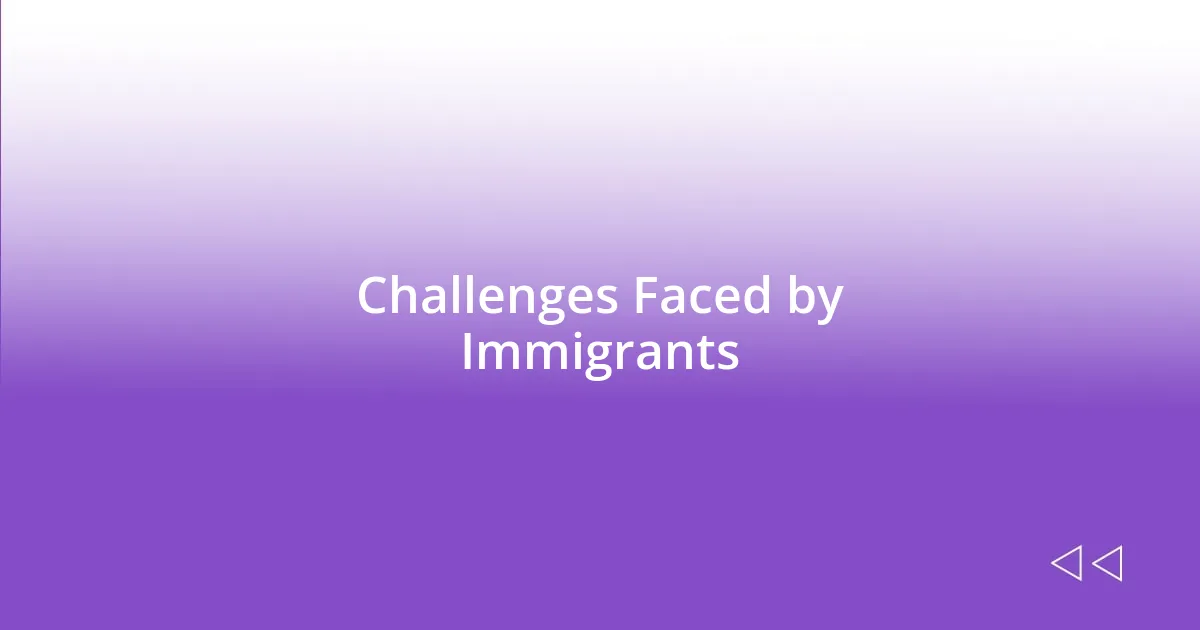
Challenges Faced by Immigrants
One significant challenge that many immigrants encounter is the daunting task of adapting to a new culture and often unfamiliar societal norms. I remember chatting with a neighbor who immigrated from India. She vividly described her first weeks in the U.S., struggling to understand interactions that felt so different from what she was accustomed to back home. It was more than just cultural differences; it was about finding a place where she could express herself without fear of misunderstanding.
Beyond cultural adjustment, there are also economic hurdles that can add to the strain of the immigration experience. Many immigrants arrive with limited financial resources, which can lead to challenges in securing stable employment. Here are some specific difficulties they face:
- Cultural and language barriers: Difficulty in communicating effectively can lead to misunderstandings or even job loss.
- Emotional distress and trauma: The process of displacement often involves significant loss and grief.
- Discrimination and bias: Many face prejudice, which can limit their opportunities and affect their mental well-being.
- Legal obstacles: Navigating immigration laws and regulations can be overwhelming and confusing.
- Social isolation: The absence of a familiar support system can intensify feelings of loneliness and anxiety.
These obstacles can make the journey incredibly complex, yet many find ways to navigate them, showcasing an inspiring resilience that speaks volumes about the human spirit.
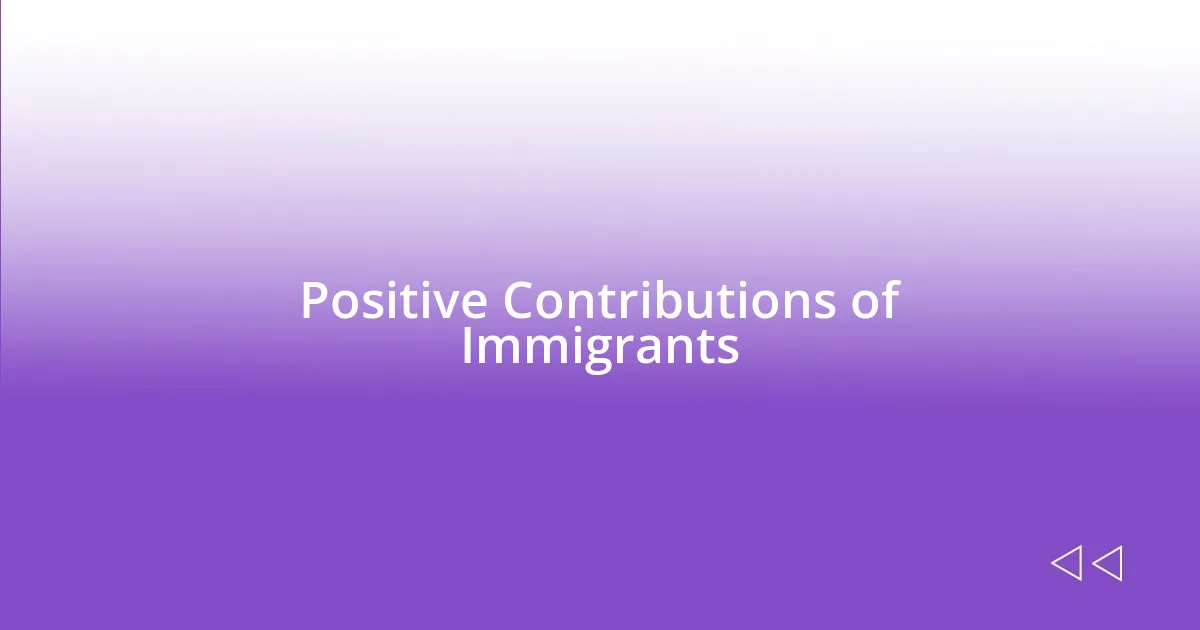
Positive Contributions of Immigrants
Immigrants bring an incredible wealth of talent and expertise to their new communities. I once met a young man from Brazil who had a background in technology. With his unique insights and skills, he not only secured a job at a local tech company but also began mentoring young adults in the community. Imagine the ripple effect—this not only boosted local economy but also inspired others to pursue careers in fields they might not have considered.
It’s fascinating to see how immigrant entrepreneurs often fill gaps in the market. Take, for example, a family I know from Vietnam that started a small restaurant. Their success lies not just in serving great food but also in creating a welcoming space that has become a gathering spot for diverse cultures. How amazing is it to think that a small business can foster such unity and understanding? It’s just one illustration of how immigrants enrich not only the economy but also the social fabric of their surroundings.
Furthermore, the collective contributions of immigrants often lead to vibrant cultural landscapes. On several occasions, I’ve attended community festivals celebrating various heritages—music, food, and art come together in a beautiful display of diversity. These events spark curiosity and connection among neighbors and promote dialogue that bridges cultural divides. I can’t help but wonder: without these immigrant stories, how much less colorful would our communities be? They remind us that our shared humanity thrives in the blend of different backgrounds, making our societal tapestry all the more intricate and beautiful.
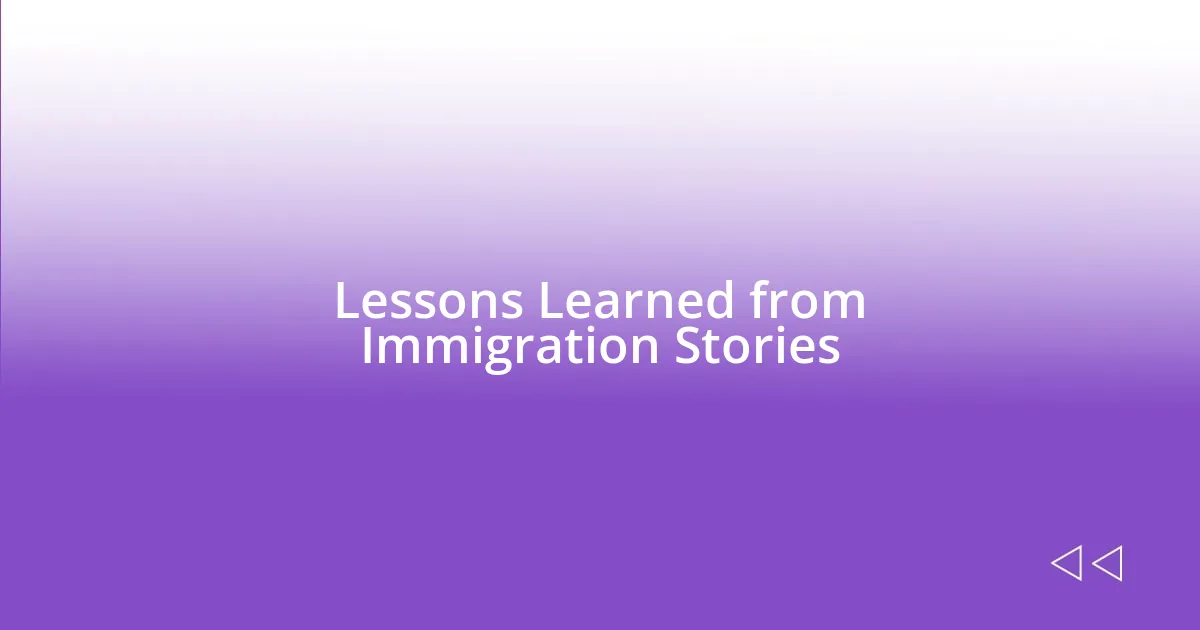
Lessons Learned from Immigration Stories
Navigating the immigration experience often brings valuable lessons about resilience and adaptability that resonate deeply. I recall a moving conversation with a former student from Syria. She shared how, despite the heart-wrenching journey to safety, she discovered an unshakeable strength within herself. It made me realize that sometimes, our struggles teach us more about our capabilities than any success ever could.
Another lesson that emerges from these stories is the importance of community support. My friend from Ethiopia often reflects on how her neighbors rallied around her family during their tough initial months. This collective kindness provided a safety net that transformed her family’s sense of belonging. When faced with hardship, isn’t it remarkable how the kindness of strangers can become a lifeline?
Finally, immigrants often teach us about the power of perseverance. I think about an elderly gentleman I met from Mexico who, after years of hard work, finally opened his own construction business. His journey was not easy, but his unwavering determination inspired those around him. Have you ever witnessed someone chase after their dreams against all odds? It’s a powerful reminder that success is often born from struggle and tenacity, enriching our communities in the process.
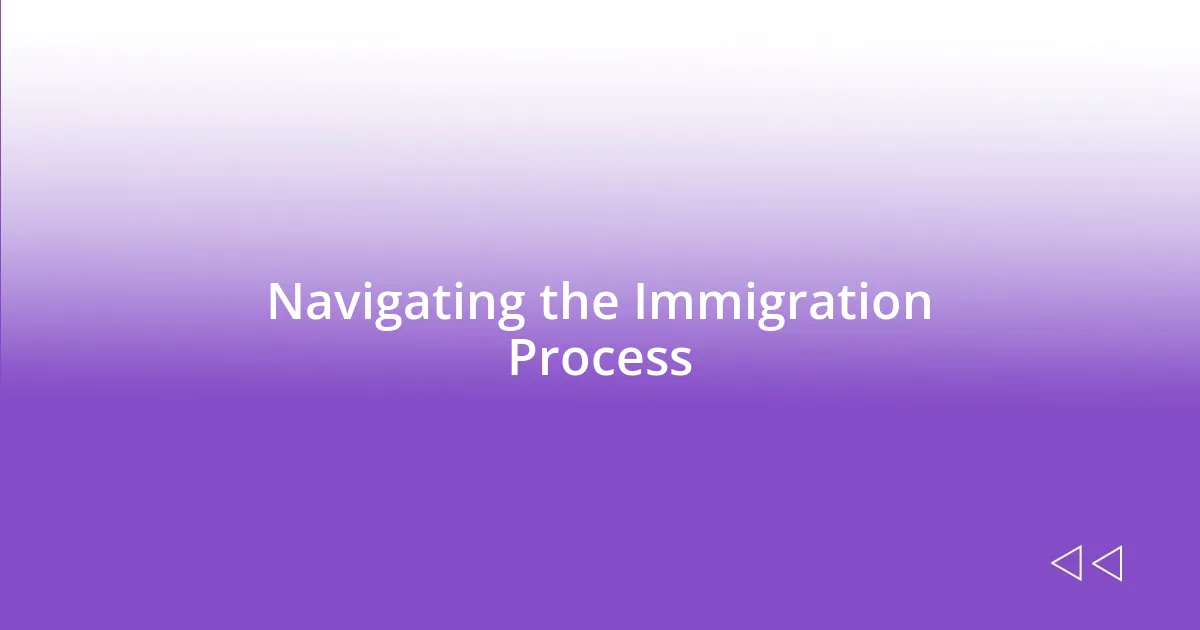
Navigating the Immigration Process
When I think about navigating the immigration process, I can’t help but recall the countless forms and interviews my friends have faced. Just a few months ago, a colleague shared her experience with the application process for her family’s green card. She described it as a maze filled with deadlines, legal jargon, and an ever-present sense of uncertainty. Isn’t it fascinating how the process can evoke such a range of emotions, from hope to anxiety, all at once?
I’ve seen firsthand how the journey often involves seeking out mentors or community organizations for guidance. A close friend of mine connected with a local immigrant support group, and it was inspiring to watch her flourish with their help. They provided practical tips about paperwork and even offered emotional support during the stressful wait times. The question I often find myself pondering is: how many lives could be transformed if everyone had access to similar resources?
The process doesn’t just affect individuals—families are often impacted too. I remember speaking to a woman from Ukraine who described the anxiety her children felt about moving to a new country. It struck me how, while adults deal with immigration logistics, children experience their own kind of turmoil, worrying about fitting into new schools. How incredible would it be if more attention was given to the emotional aspects of this transition, ensuring that families grow stronger together during the immigration process?
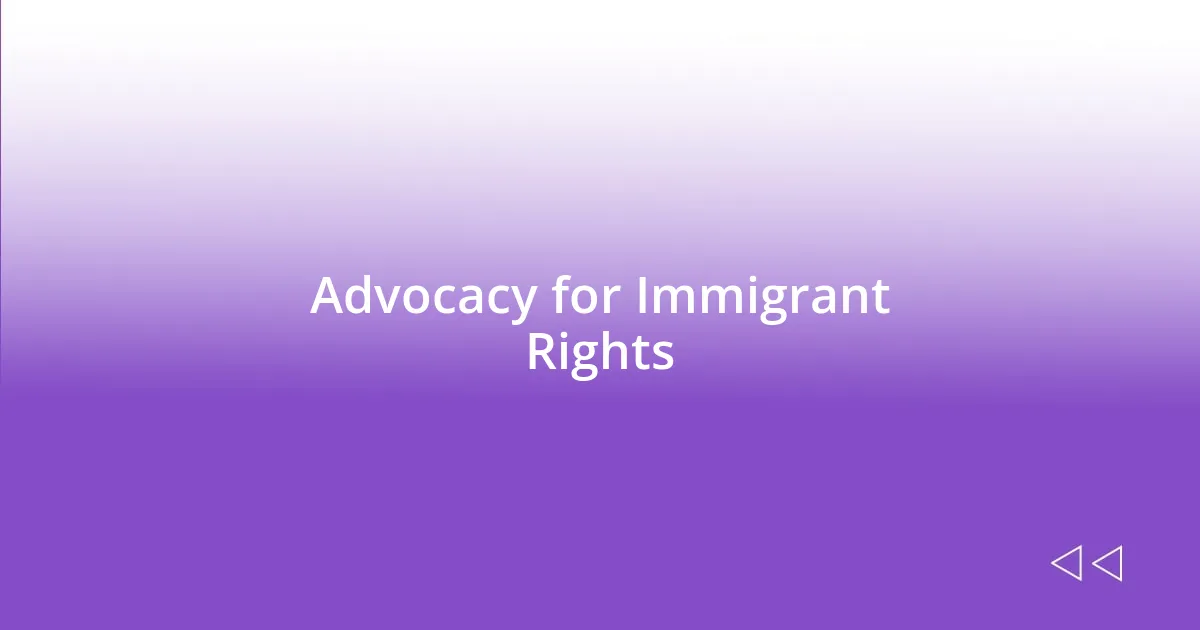
Advocacy for Immigrant Rights
Advocacy for immigrant rights is something I hold close to my heart, reflecting the intense passion I’ve seen in those who have faced systemic barriers. A few months ago, I attended a rally focused on raising awareness around deportation and refugee rights. The stories shared by the speakers resonated profoundly with me; each tale carried the weight of desperation and hope in equal measure. Isn’t it powerful to see individuals unite, amplifying their voices to demand dignity and respect?
I’ve had the privilege of volunteering with organizations that advocate for these rights, and I’ll never forget the woman I met there from El Salvador. As she recounted her harrowing journey to the U.S., I could feel her frustration with the legal hurdles she faced here. It dawned on me how fundamental advocacy isn’t just about policies—it’s about people and their experiences. When we unite to create systemic change, we’re not only reshaping laws; we’re honoring each story behind those struggles.
Sometimes, I ponder the role of individuals in supporting immigrant rights. Can one person really make a difference? I remember a friend who tirelessly lobbied for local legislation that would grant access to education for undocumented children. Witnessing her dedication sparked a realization in me: collective action stems from individual efforts, no matter how small. It may seem daunting, but isn’t it true that every ripple contributes to a larger wave of change? Each gesture of support can resonate throughout the community, fostering an environment of inclusivity and hope.












